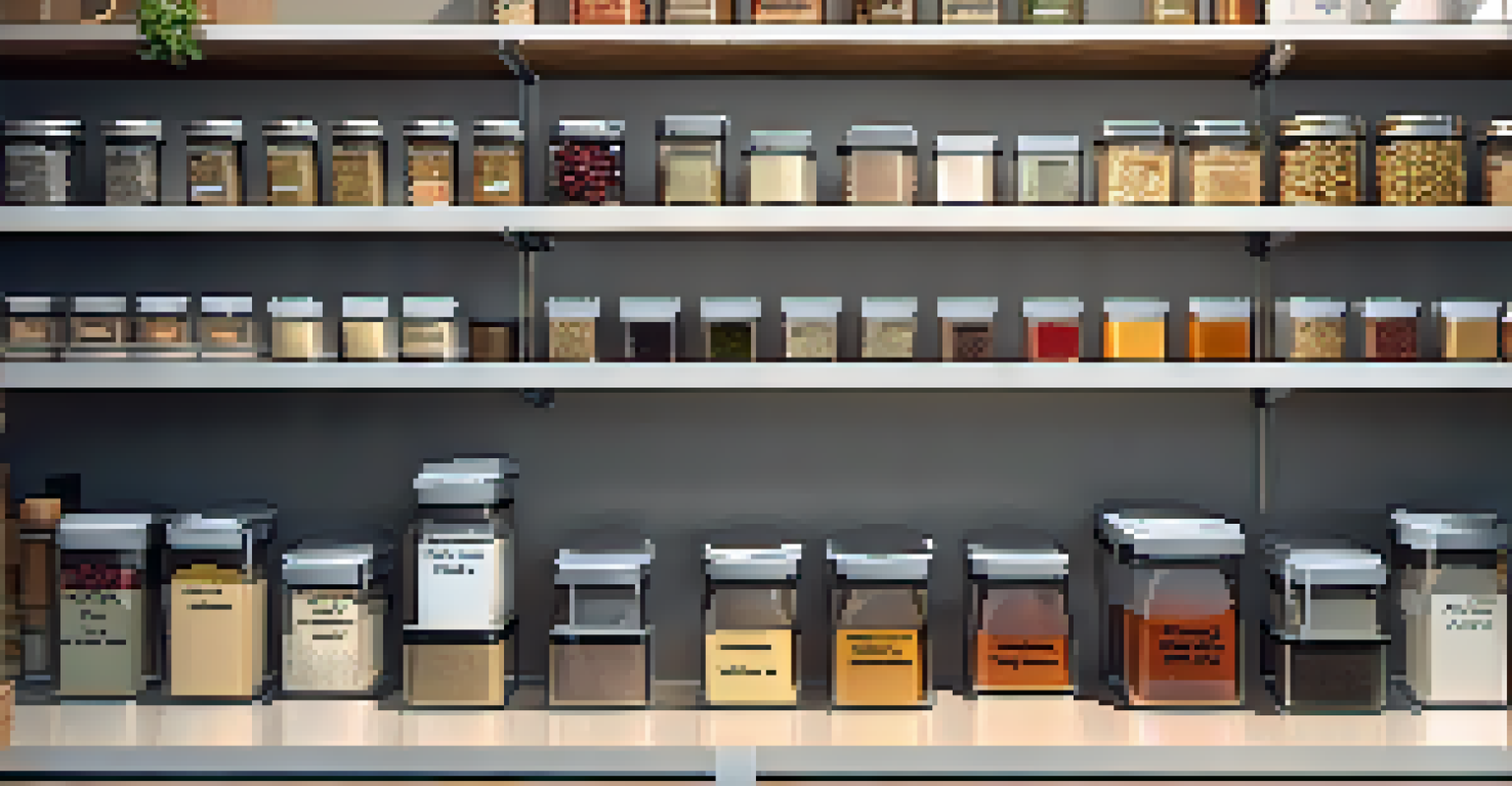Plant-Based Cooking: Tips for Small Kitchen Efficiency

Maximizing Counter Space for Meal Prep
In a small kitchen, every inch of counter space matters. To make the most of it, consider investing in stackable cutting boards and nesting bowls that can be tucked away when not in use. This not only keeps your workspace tidy but also allows for more efficient meal prep, as you can quickly grab what you need without fumbling around.
The kitchen is the heart of the home.
Another great tip is to declutter your countertops regularly. Keep only the essentials, like your knife block and a cutting board, visible. By reducing the number of appliances and tools on display, you'll find it easier to prep your plant-based meals without feeling overwhelmed.
Lastly, consider using a rolling cart if you have the room. This mobile workspace can hold ingredients and tools, providing extra surface area when needed while being easily tucked away when you're done cooking.
Smart Storage Solutions for Ingredients
When it comes to plant-based cooking, having a well-organized pantry is key. Use clear containers to store grains, legumes, and spices, allowing you to see what you have at a glance. Labeling these containers will save you time when you're in the middle of cooking, ensuring you grab the right ingredients quickly.

Vertical storage can also be a game changer in small kitchens. Utilize wall-mounted shelves or hooks to hang pots, pans, and utensils. This approach frees up cabinet space for food items and keeps your most-used tools within easy reach, streamlining your cooking process.
Maximize Small Kitchen Efficiency
Utilize stackable tools, declutter regularly, and consider mobile storage options to enhance your meal prep experience.
Don't forget about under-utilized spaces, such as the area above your cabinets or the insides of cabinet doors. Small racks or magnetic strips can hold spices or kitchen tools, making the most of your available space and keeping everything organized.
Batch Cooking: Save Time and Space
Batch cooking is an efficient way to prepare meals in advance, especially in a small kitchen. Dedicate a day each week to cook large quantities of plant-based dishes that can be stored in the fridge or freezer. This not only saves time but also reduces food waste, ensuring you have healthy options ready to go.
Cooking is like love. It should be entered into with abandon or not at all.
When batch cooking, choose recipes that share similar ingredients or flavors. For instance, a large pot of quinoa can be used in salads, bowls, or stir-fries throughout the week. This strategy not only saves space but also minimizes the number of different items you need to store.
Investing in quality airtight containers is essential for storing your batch-cooked meals. They help keep your food fresh longer and make it easy to grab a meal from the fridge or freezer whenever you need it, perfect for busy days.
Multifunctional Kitchen Tools to Invest In
In a small kitchen, multifunctional tools can make all the difference. Consider a food processor that not only chops veggies but can also make sauces, dips, and even doughs. This eliminates the need for multiple appliances, freeing up valuable counter space.
Another great investment is an Instant Pot or slow cooker. These devices allow you to sauté, steam, and slow-cook all in one pot, making meal prep seamless. Plus, they can handle a variety of dishes, from soups to stews, making it easier to experiment with plant-based recipes.
Organize Ingredients Smartly
Clear containers and vertical storage solutions keep your pantry neat and make ingredient accessibility a breeze.
Don’t overlook a good set of knives, either. A quality chef's knife can handle most of your chopping needs, while paring and serrated knives can tackle smaller tasks. This streamlined approach keeps your kitchen efficient and allows you to focus on creating delicious meals.
Using Seasonal Produce for Freshness and Flavor
Cooking with seasonal produce not only enhances the flavor of your dishes but also helps you make the most of your small kitchen. When you buy fruits and vegetables that are in season, they’re often fresher and more affordable. This means you can enjoy vibrant flavors without breaking the bank.
In a small kitchen, consider joining a local CSA (Community Supported Agriculture) program. This option often provides a variety of seasonal produce directly from local farms, minimizing the need for excessive storage. You'll also get inspired by new ingredients to try in your plant-based meals.
Lastly, be sure to plan your meals around what’s in season. This not only ensures that your dishes will be delicious but also encourages you to explore different plant-based recipes that highlight seasonal ingredients.
Efficient Meal Planning for Plant-Based Diets
Meal planning is a powerful tool for anyone cooking in a small kitchen. By outlining your meals for the week, you can streamline your grocery shopping and minimize clutter in your pantry. This proactive approach means you’ll always have the ingredients you need on hand, making the cooking process smoother.
When planning your meals, aim for a balance of nutrition and variety. Incorporate a mix of grains, proteins, and vegetables to ensure you're getting all the essential nutrients. It's also helpful to include a few versatile ingredients that can be used across multiple meals, saving you both time and space.
Plan Meals for Success
Effective meal planning and batch cooking not only save time but also reduce waste, ensuring you enjoy healthy, plant-based meals.
Finally, keep your meal plan visible. Whether it's a chalkboard in your kitchen or a note on your fridge, having a reminder of what to cook each day keeps you organized and motivated to stick to your plant-based diet.
Cleaning and Maintenance Tips for Small Kitchens
In a small kitchen, keeping things tidy is crucial for maintaining efficiency. Develop a cleaning routine that involves wiping down surfaces and washing dishes immediately after use. This prevents clutter from building up and allows you to enjoy your cooking space fully.
Utilize organizers and baskets to keep your pantry and fridge neat. Group similar items together and regularly check for expired goods to make sure everything stays fresh. This not only saves time when cooking but also makes it easier to find what you need.

Lastly, consider deep cleaning your kitchen periodically. This includes cleaning appliances, scrubbing cabinets, and decluttering any unnecessary items. A fresh and organized kitchen can be a huge motivator for cooking more often and enjoying the process.